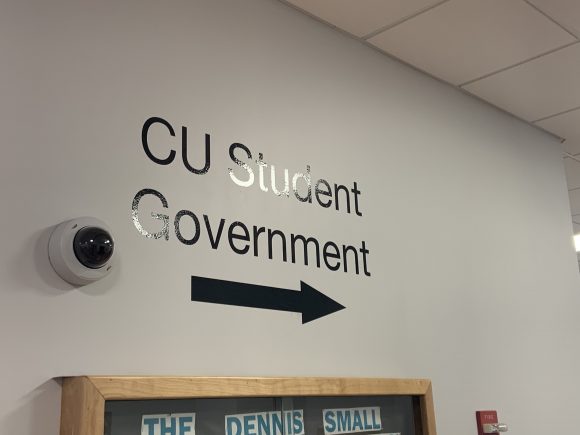
Signage denoting the entrance to CUSG’s offices on the first floor of the UMC. Oct. 15, 2021 (Henry Larson/CU Independent)
On Thursday, March 16, the University of Colorado Boulder Student Government’s (CUSG) Legislative Council passed its 2024 fiscal year budget package, totaling approximately $33.4 million in spending.
The CUSG Constitution requires an annual review of the student fee budget package. For this review, executives and members of legislative council and the finance board meet to discuss the budget and hear requests from 12 CUSG cost centers and other programs that require funding.
CUSG manages financial support for these activities through the mandatory Student Activity Fee, which is about $300 for most undergraduate and graduate students. An additional $4 million is collected through self-generated revenue from cost centers, such as ticket sales or equipment rentals.
Most of the student fee funds go toward CUSG’s largest cost centers, including $9.1 million for the Recreation Center and $8.7 million for the University Memorial Center. The largest increases in this year’s budget came from rising wages across many cost centers.
CUSG also funds the continued maintenance of many outdoor recreation fields on campus, several new paid positions within student government and its cost centers and other general campuswide costs.
This year, CUSG is $2.8 million in deficit. That means the money collected for use by the student government, including student fees and self-generated revenues by their cost centers, is less than the cost of this year’s budget.
Sydney Strecker, the chair of the finance board, said this issue is a result of conservative student fee increases in the past, campuswide increases in minimum wage, inflation and the cost of returning to pre-pandemic operations.
“From our perspective, the deficit is a result of a lot of intertwining factors,” Strecker said. “I think of it as really kind of like a perfect storm.”
Initially, members of the board predicted they would be $1.3 million in deficit this year, based on the assumption that the university’s enrollment would increase by half a percent in the coming year. However, the university system expects enrollment to decline for the 2023-2024 academic year, according to officials at last month’s Board of Regents meeting.
Strecker expects the deficit issue will last for another two or three years, which will require CUSG to continue to draw on its reserves for the time being. Student fees will also be raised by $10 this coming year, the maximum allowed by university officials.
However, some debt accrued across cost centers will be paid off in the coming years. That change will mean about $40 of each student’s fees will no longer have to be used for these bonds and can be put towards recovering from the deficit, according to Strecker.
Members from legislative council have been attending budget hearings since February to go over the cost center budget requests and ask questions about the various proposals.
After reviewing the full budget package on March 8, legislative council approved the budget on the second reading on March 16. The budget package for the 2024 fiscal year will take effect in July and run through the first half of next year.
Finance board members review the budget at the beginning of the spring semester. They meet at 5:15 p.m. on Tuesdays in the University Memorial Center.
“If people are ever curious and want to hear more about [the budget], our meetings are open, and we would love to hear that student perspective from people who may be concerned or interested or want to make a change,” Strecker said.
Contact CU Independent Editor-in-Chief Henry Larson at henry.larson@colorado.edu.
Contact CU Independent News Editor Bella Hammond at isabella.hammond@colorado.edu.
